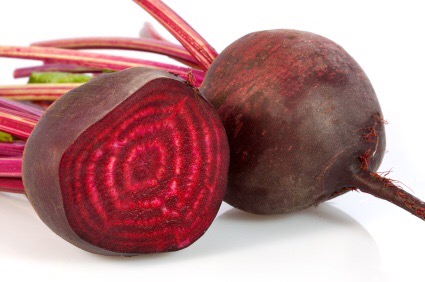
Beetroot

Numerous study are focus on benefit of consumption or drinking-eating beetroot, especially the greens, which are rich in calcium, iron and vitamins A and C. Beetroots are an excellent source of folic acid and a very good source of fibre, manganese and potassium gaining in popularity as a new super food due to studies claiming that beets and beetroot juice can improve athletic performance, lower blood pressure and increase blood flow.
Various Universities invest in study and reserch related to this root, all the Phytochemical and mechanism of interactions and synergies that involves our body.
Drinking beetroot juice after exercise reduces muscle soreness and helps your muscles recover according to new research from Northumbria University, published in this month’s European Journal of Applied Physiology (EJAP). The authors suggested that the nitrates and betalains in beetroot juice, which have been shown to act as antioxidants, might have aided exercise recovery by preserving muscle function and reducing inflammation.
The study measured soreness in both the thigh and calf muscles in active people, rather than in elite athletes, so this new research may be of more interest to real-world people. What’s more, these muscle groups are not only in use with counter movement jumps and drop jumps, but are used in running, cycling and walking. So people who suffer sore muscles after such activities could benefit from consuming beetroot or its juice. It’s also thought that the mechanism that helped the thigh and calf muscles recover faster with beetroot is not specific to the muscle groups studied, but in fact that this mechanism could apply to other muscle groups left sore after exercise.
Take a shoot of pure performance!
The latest research, by the University of Exeter, suggests that two concentrated beetroot “shots” a day (with about 0.6g natural dietary nitrate) are better than one, and the best time to take them is about 2.5 hours before maximum exertion.
The University’s Sport and Health Sciences department, has published a new paper in the Journal of Applied Physiology looking at the effects of taking three different doses of beetroot juice on different exercise patterns.
The research team, led by Professor Andy Jones, used Beet-It, concentrated beetroot juice, which is sold in 70 ml shots. The three doses used in the study were 1 shot, 2 shots, or 4 shots.
Professor Andy Jones said: “Our original research indicated that the amount of dietary nitrate makes a difference to its impact. This new paper provides a much clearer picture of when and how much is optimum. In particular, it underlines that there is no advantage to be gained from taking very large doses”.
Previous research has indicated that beetroot improves sporting ability and stamina because of its high nitrate content.
This latest study suggests that effect on performance is at its peak 2-3 hours after ingestion, and that the effects gradually decline, with little improvement being seen after about 12 hours.
In the study, the amount of oxygen required to maintain a given level of moderate exercise decreased after taking beetroot juice – in effect, it took less energy to cycle at the same pace. The best results decreased oxygen consumption by about three percent.
Credits:
University of Exeter
http://www.exeter.ac.uk/news/research/title_290840_en.html
Looking for green tea extract or other phytochemical….go to site!
